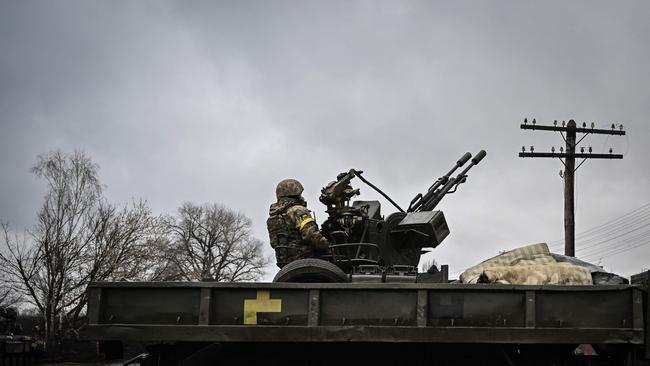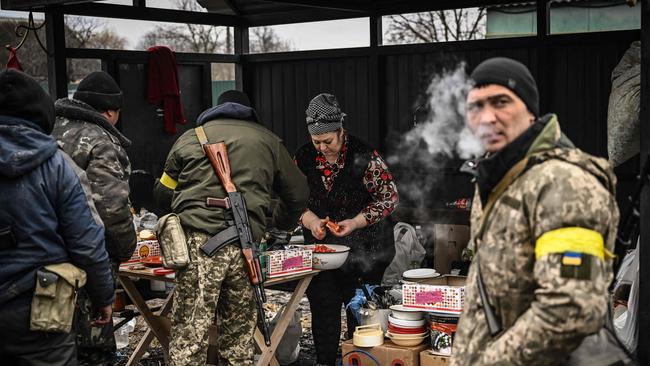
Partly this is the triumph of 24-hour digital publishing. Once expert opinion was carefully considered; now the digital beast is so hungry, commentators can barely keep up with demand.
Last week some commentators were declaring as early as Tuesday night that Ukraine had won, simply by standing up to Russian President Vladimir Putin. By Wednesday some were forecasting a new world order in which a united US and NATO would be ascendant over China and Russia.
It was a premature judgment to say the least. Others saw ominous signs of the moral decline of the West in Putin’s calculated adventurism.
The truth is no one knows how the Ukrainian conflict will play out. But some things did become clear early. Russia’s forces have been exposed as less powerful than the West imagined. This repeats what the West discovered at the end of the Cold War when the US military realised Russia had lied about its weaponry.
It is also clear journalists, like those at The New York Times who in 1999 welcomed the ascension of a former KGB colonel, Putin, to Russia’s prime ministership under former president Boris Yeltsin, misunderstood both men.
On show for the world last week was a dictator who runs his country like a personal fiefdom. He is one of the world’s richest men but his country is poor. Russia, with 146 million people, had annual GDP in 2020 of $US1.483 trillion, barely higher than Australia’s $US1.33 trillion.
Even China, which some commentators claim is the world’s richest nation, is poor per capita, with GDP of $14.72 trillion and 1.44 billion people. The US, with 330 million people, has GDP of $20.94 trillion.
This is not to say the West should be complacent about last month’s pact between Putin and China’s president-for-life Xi Jinping. Quite the opposite, as this column has previously pointed out. But journalists need a clear-eyed view of the strengths, weaknesses and motivations of the two countries that see little future for Western-style democracy.

The left here has underestimated how dangerous the civilisational differences between the hardline autocracies and liberal democracies are. Prominent former Labor leaders have urged economic pragmatism, misunderstanding public sentiment about bullying by totalitarian states.
It is also clear many journalists don’t understand the history of Ukraine-Russian relations.
Joseph Stalin’s role in the 1932-33 Ukrainian famine that killed five million people provides perspective. The late Robert Conquest’s Harvest of Sorrow is the definitive text. While it was being published in 1986, many Australian intellectuals were still starry-eyed about the former Soviet Union.
Readers wanting a better understanding of the life and crimes of Putin won’t do much better than signing up as a reader of Matt Taibbi’s newsletter on Substack. His piece last week, Putin the Apostate, a powerful take from Taibbi’s time as a magazine editor in Russia, outlines Putin’s financially controversial time as an adviser to the former mayor of Leningrad, his role in the rape of Russian state enterprises and in the murders of prominent Russian journalists.
In the past week, two conservatives in the Australian media – Gerard Henderson in his Media Watch Dog blog and Rita Panahi in her Herald Sun column – were spot-on with their observations about former US President Donald Trump, Ukraine and Russia.
Henderson wrote last Monday that while US President Joe Biden had failed to send arms to Ukraine, Trump – a supposed Putin puppet, according to the Russiagate hoax – had sent Ukrainian leader Volodymyr Zelensky the Javelin antitank missiles being used against Russian forces.
On March 2, Panahi pointed out Trump had also tried to block the Nord Stream 2 gas pipeline taking Russian gas to Germany. She pointed to public polling showing “62 per cent of Americans say Putin wouldn’t have moved against Ukraine if Trump were president.”
Now Germany is discussing reopening coal-fired power plants to maintain energy security from Moscow, and much of western Europe is discovering the importance of reliable baseload power. Australian gas exporters will be a beneficiary.
Many conservative commentators have argued Putin attacked Ukraine because he knew so-called “woke” Westerners would do nothing about it.
Truth is, Putin has watched the West stand up for its values for the past two decades as it hunted down and destroyed much of the terror networks of al-Qa’ida and ISIS and invaded Iraq and Afghanistan to further the “war on terror”.
More likely, Putin thought he had a nod from China last month and took President Biden’s foolish December 9 public declaration that the US would not send troops to protect Ukraine as a sign he was safe to move.
Some conservatives see the invasion as a signal Russia and China are deliberately challenging the post-World War II rules-based order. Holman W. Jenkins in The Wall Street Journal and Daniel Finkelstein in The Times are closer to the mark.
Jenkins sees the invasion as a last roll of the dice by Putin: “Mr Putin’s retreat into solipsism didn’t begin with Covid but the Arab Spring, which he saw as a harbinger of his own ending.” Jenkins said China’s behaviour since the attack showed it was not ready for global responsibility.
Wrote Finkelstein on Thursday: “This war is a rebuke to those people who think that Western liberal democracy is so flawed as to be almost worthless. Yet in Ukraine people are dying to advance the dream of being a Western liberal democracy, which they correctly see as liberation.”
This newspaper’s Paul Kelly, and former PM Kevin Rudd, argue the Putin attack and the 5000-word statement by Putin and Xi early last month signal their intention to weaken the US and could make China a bigger danger to Australia.
Yet Biden’s firmness against intervention places pressure on NATO to boost its own military forces and engagement on its eastern flank. It’s what Biden’s predecessors, Trump and Barack Obama, had been arguing for.
And wise heads on the Central Committee of the Chinese Communist Party, already apprehensive at Xi’s concentration of power, will see in Western unity behind Ukraine a warning about how the modern world views invasion of sovereign neighbours such as Taiwan. Foreign policy hawks have made much of China’s refusal to condemn Russia at the UN, but they could ask whether China’s abstention is a signal China is anxious about Western financial sanctions over the invasion.
Like Putin, Xi is a billionaire with a lot to lose. His economy is shaky because of the giant Evergrande property collapse. He publicly opposes central bank monetary tightening. Why? Because the Chinese economic miracle, like Japan’s before it, was built on an unsustainable property bubble that is now unwinding.
No doubt Putin and Xi are correct in assessing the US as divided and weak.
But despite the horrors in Ukraine last week and Putin’s dark hints about nuclear weapons, there are some positives: Europe is being forced to rethink its energy policies, Germany has committed to spend more on defence, Ukraine is rising to defend democracy and a young generation is learning what real aggression looks like – and it’s not what they discuss on social media.




Never have so many sweeping global forecasts been published with so little evidence as during the first week of Russia’s invasion of Ukraine.